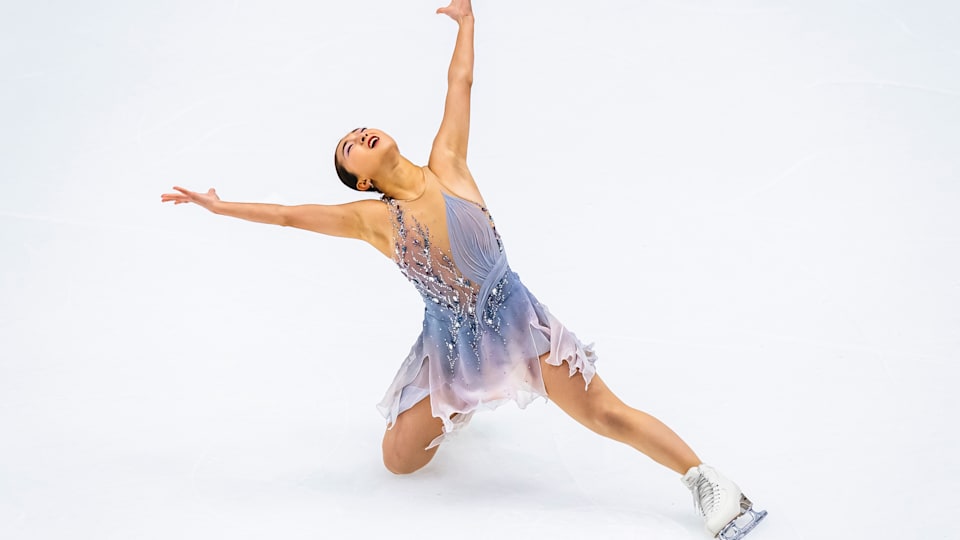World champion Sakamoto Kaori on how embracing pressure has only made her stronger: 'It calms me down'
The reigning and two-time world champ from Japan heads to the 2024 World Championships with a renewed sense of motivation - and self. She spoke exclusively to Olympics.com.

As two-time and reigning world champion, Sakamoto Kaori has delivered a golden season thus far in figure skating, and says the very thing that helps her calm down is to accept her inevitable nerves at major competitions.
“The more I try to fight off pressure and tension, the more nervous I get,” Sakamoto tells Olympics.com. “But when I accept the fact that I am nervous, it calms me down... I often think about what I'm going to do after this competition [and] I calm down a lot.”
Sakamoto, 23, sets out to become the first woman to go back-to-back-to-back at the World Figure Skating Championships since Peggy Fleming won three in a row 1966-68.
It’s a level of sustained success that few in the sport have reached prior, but one that Sakamoto has made her way to with experience, now a two-time Olympian, having won bronze at Beijing 2022.
After a season of finding her way, Sakamoto feels rejuvenated as the Winter Olympic cycle hits its halfway point, with Milano Cortina 2026 just two years away.
“I can really feel that I've grown more this year than last year,” she says. “I am much more motivated.”
Sakamoto hasn’t lost at any event she’s competed in since the 2022 Grand Prix Final, when she slumped to fifth place after winning the short program.
She says in part that this season is “revenge” for that Final appearance.
“I am motivated to keep doing like this,” she says. “My feelings are totally different from last year."
Sakamoto Kaori: On focusing her life on skating
There hasn’t been a world champion figure skating like Sakamoto in recent memory. She exudes a sort of confidence that only comes within a third Olympic cycle as she makes her way toward 2026.
While she faces down her own fears with continuing successes, Sakamoto has an unassuming coat of armour that surrounds her as the top female skater in the world: “When people say to me like, ‘You're going to win this competition’ I am like, ‘Oh! OK…’”
“It still happens a little bit.”
But Sakamoto is more focused on the process, and has used her past experiences to propel her forward – this season and beyond, she hopes.
“I've been trying to make my personal life better for skating, I think that's the reason why I'm able to skate in a natural way now,” she explains, having felt as though she couldn’t find the right balance previously.
“I used to separate my personal life from the competitions,” she continues. “Now it's like, ‘My body's having a hard time today, so I'm going to take good care of it.’”
It’s an approach that has served Sakamoto well. Especially as she settles more into this phase of her career.
How 'past experiences' have shaped her
Sakamoto’s goal was to sweep the Grand Prix Series, the same first half of the season in which she faltered last year in Turin, Italy. She did just that, culminating at December’s GP Final and then won a third consecutive national title as she set her sits for similar at this week’s Worlds.
She has dedicated her short program this season, set to Baby, God Bless You, to her young niece and nephew, who she says serve as rejuvenating forces in her otherwise pressure-filled life.
“I feel like when I see [my niece] I’m in a state of healing,” she says.
“When I push myself hard, really hard... I go to see her,” Sakamoto continues. “I feel ready to work hard again (after seeing her), so it's not just a little bit, but actually a lot [the affection].”
When she arrives to the World Championships, she knows that she’ll feel those aforementioned nerves – the ones that she’s embraced instead of ignored.
“I'm really scared and very nervous in such competitions... I get so nervous that my hands and feet shake,” she says. “But I've had a lot of support from my past experiences.”
Those experiences are what sets Sakamoto apart. What she creates with them next? That’s for us to wait and see.
